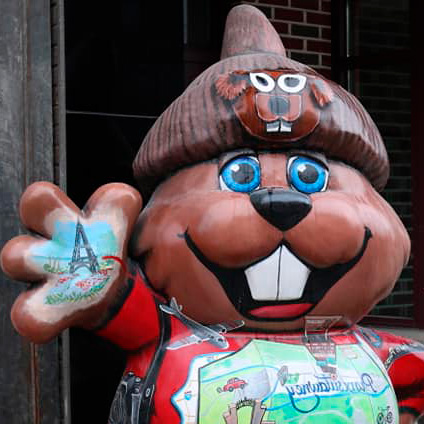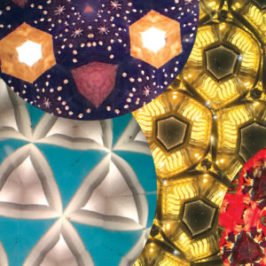
Three poems about animals that generally stay out of sight during the winter, by Lisa Bellamy, Judith Bernal and Stuart Chalfant.
7 minutes
TRANSCRIPT
On this edition of Burning Bright, three poems about animals that generally stay out of sight during the winter.
According to The History Channel’s website, Groundhog Day has its roots in the ancient Christian tradition of Candlemas, when clergy would bless and distribute candles needed for winter. The candles represented how long and cold the winter would be. Germans expanded on this concept by selecting an animal — the hedgehog — as a means of predicting weather.
In this country, Groundhog Day’s been around since 1887.
Groundhog Day is also, probably not coincidentally, the midpoint between the winter solstice and the spring equinox.
Lisa Bellamy said that this next poem sprang from her love of forms like recipes, encyclopedia entries, and fill-in-the-blank questionnaires. Also, evidence of a persistent woodchuck on her Adirondack property.
To celebrate Groundhog Day, here’s Lisa Bellamy’s poem “Woodchuck-a-phobia.”
What is Woodchuck-a-phobia?
A condition in which a woodchuck’s eerie whistle — New England farmers called it Whistle Pig and suspected it of congress with the Devil — or the sight of it sunning itself, or the sight of its wet snout, or its lumpish torso waddling into the brush after one shrieks, or the sight of yet another filthy hole it has dug just steps away from the house, or even a memory or stray thought about the woodchuck, causes extreme fear of the woodchuck.
What is extreme fear of the woodchuck?
The jittery state. Dizziness, inability to concentrate on tasks after an encounter with the woodchuck, even if one is “safely” inside the house. The agitation thrumming in one’s mind like a relentless sewing machine. The memory of stink. The restless dreaming of a muddy paw over one’s mouth. The worry that the woodchuck will tunnel so extensively and elaborately under the house, will construct such a complex branching series of multi-layered tunnels — as they are known to do — that the house will collapse, due to foundation failure.
What is collapse?
Collapse is the chaos and danger — often mortal — one experiences when foundations, cement basement pillars, door frames, light fixtures, ceilings, windowsills and roofs, lose sturdy reliability. A woodchuck digging tunnels next to one’s house calls this whole set-up into question. When one experiences the possibility of collapse, any promise, affirmation, vow, or article of faith can also eventually lose its sturdy reliability. A seemingly content couple can begin to notice tiny fissures, slivered cracks, in the other’s previously truthful representations and, in fact, betrayals of various sorts can eventually occur.
What is sturdy reliability?
A characteristic of things that are trustworthy. Sturdy reliability promotes faith that agreed-upon assumptions and representations are believable and firm. A ceiling, for example, is a representation that the room under the ceiling will continue to exist as a room and not a pile of rubble under which one will moan weakly — if one can moan at all. Sturdy reliability is the representation that the ceiling will act in accordance with its nature.
What is Nature?
Nature is the essence of things.
What is the essence of the woodchuck?
In accordance with the deepest principles of Nature, one must admit that, in addition to eating, defecation, sex, sleep, labor, and pleasure, the essence of the woodchuck is to make tunnels.
“Woodchuck-a-phobia” by Lisa Bellamy from Passager Issue 64.
Here’s another poem about a creature we don’t see much in the winter, the bear. The idea for Judith Bernal’s poem came to her as she watched a video of a bear messing with a friend’s bird feeders. She said, “That year, many young male black bears were moving from Pennsylvania toward the Adirondacks, and I imagined the dangers and obstacles on the way.”
Here’s her poem “A Bear.”
A bear
tracks through the forest
alone almost everywhere
people roads machines
yet he travels north
unseen. An occasional hiker
discovers scat a track or two
drying in soft ground.
Behind a hillside home
the bird feeding station ruined
posts smashed seeds devoured.
In our spreading settlements bustle
and change our hectic dominion
unchecked. Deep forest campers
might hear a bear’s muffled journey
over seven times seven counties
skirting hundreds of thousands of us
moving bear north to bear country
wanting only to be what he is
Judith Bernal’s poem “A Bear,” from Passager’s 2019 Poetry Contest issue.
Stuart Chalfant said that his poem “Toad” was inspired by an actual toad that appeared near his front door almost daily for a few months and then disappeared. He said its disappearance left a heartfelt void.
Outside our door
a toad appeared,
soft and confident
on the entry step
as if to come in.
Was this the same
we saw last spring
emerging from
the lilies? Some say
the frogs have
disappeared, and
now the toad is in
its twilight. Where
will a boyish heart
find kinder friends,
patient in the hand
and glad for warmth?
“Toad” by Stuart Chalfant from Passager’s 2009 Poetry Contest issue.
To purchase any of these issues, subscribe to Passager, or learn more about the press and its commitment to writers over 50, go to passagerbooks.com. You can download Burning Bright from Spotify, Apple and Google Podcasts, and various other podcast apps.
Photo for this episode’s cover art by Diane Siskowic-Jurkovic.






